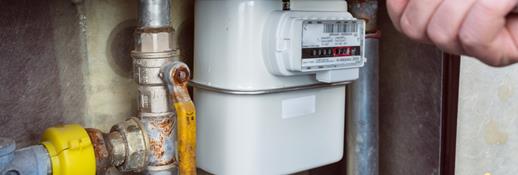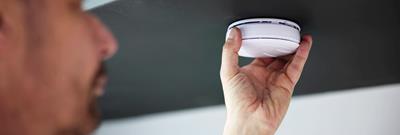
The smell of gas at home makes anyone worry for their safety - and for good reason.
A nautural gas leak from a household appliance like a cooker or boiler or some other source poses a serious thread, and you must take it seriously.
EASY AS HACK
If there’s a gas leak, you’ll save valuable time if you know how to shut off the gas supply. So be prepared by familiarising yourself with the emergency shut-off valve, which is often near the gas meter in most homes.
At a Glance
A gas leak at your home is potentially hazardous for two reasons:
- Natural gas is highly flammable, meaning a leak can easily ignite and cause fires or explosions if exposed to a spark.
- A natural gas leak can release carbon monoxide (CO), which is poisonous. Breathing it in can, in severe cases, lead to loss of consciousness and death.
It’s no exaggeration to say that knowing how to react to a gas leak could save lives, yours and the people who live with you. It could also save your property. Here’s an in-depth guide to what to do, including the gas leak symptoms that should be on your radar and how to prevent a gas leak in the first place.
gas leak symptoms
It’s essential to know the symptoms of a natural gas leak in your home so that you are alerted in time to any potential danger. Gas leak signs and symptoms include:
- A smell like rotten eggs
- A hissing sound
- Unusually high gas usage detected by a smart meter
- Air bubbles in still water
- Dying house plants
- Your natural gas detector or CO alarm goes off.
You might also begin to feel the physical effects [1] of CO poisoning, which could also be a warning you have a gas leak. These include:
- Headache
- Fatigue
- Dizziness
- Chest and muscle pain
- Nausea and vomiting
- Confusion
- Shortness of breath.
What to do if you smell gas?
Here’s a step-by-step guide to what to do if you smell gas in your home:
Allow air to circulate
Open all the doors and windows to allow fresh air to circulate in your home. That way, the gas will disperse as quickly as possible.
Turn off your gas supply
Find the mains tap, which is usually located near the gas meter, and turn the emergency control valve (also called the gas emergency shut-off valve) 90 degrees to shut off the supply. Don’t do this If your gas meter is in a basement or cellar or at the LPG bulk tank or storage vessels.
Evacuate
Ensure everyone in the property gets out immediately. Tell your neighbours about the leak, as they could also be affected.
Call for professional help
You should call your region’s 24-hour national gas emergency helpline and follow the advice. The free-of-charge regional numbers are:
|
England, Wales and Scotland |
0800 111 999 |
|
Northern Ireland |
0800 002 001 |
|
Isle of Man |
0808 1624 444 |
|
Guernsey |
749000 |
|
Jersey |
01534 755555 |
If you’re feeling unwell
You could be suffering from the physical effects of CO poisoning, so visit a hospital or your GP as soon as possible.
Wait for the all-clear
Once you’ve evacuated your property, you should wait for the all-clear before returning inside. Don’t turn the gas supply on again until a Gas Safe-registered engineer has checked it.
What not to do if you smell gas?
If you smell gas inside your home, you must not do the following:
-
Smoke
Do not smoke, light a match or use any naked flames inside the property
-
Electrical appliances
You should not turn on or off any electrical switches or electrical appliances
-
Devices
Don’t use any devices such as mobile phones, doorbells, electrical switches or anything else that could cause a spark within the property
-
Re-enter the property
Do not enter the property until a certified gas professional has given the all-clear.
how to prevent gas leaks in your home?
To reduce the chances of dealing with a gas leak emergency, here’s how to prevent a gas leak:
- Make sure your gas appliances are fitted and checked annually by a Gas Safe-registered engineer
- Install a CO detector in your home, as CO is often a byproduct of a gas leak
- You could also purchase a gas leak detector, which detects natural gas
- If you live in a rented property, ensure your landlord provides you with a gas safety certificate, or CP12, a legal requirement in the UK[2]. It confirms a qualified gas engineer has checked your gas appliances.
why are gas leaks in your home so dangerous?
Gas leaks in your home are dangerous because natural gas is highly flammable, meaning a leak can easily ignite and cause fires or explosions if exposed to a spark.
Another severe hazard when you have a gas leak is the release of CO, which is colourless, odourless and poisonous. The release can happen when the natural gas used in a household appliance like a cooker, or a boiler isn’t properly mixed with air to burn completely. The result is that it produces CO instead of just carbon dioxide.[3]
According to the Office of National Statistics,[4] CO poisoning caused 1,777 deaths between 2010 and 2020. That’s an average of 161 deaths per year.
are gas leaks covered by home insurance?
A typical home insurance policy generally covers damage to your home caused by a gas explosion. However, it's important to double-check your policy wording to confirm this coverage.
Certain emergencies, such as pipe leaks, and boiler repairs may not be included in a standard home insurance policy. Optional covers are usually available if you’d like extra peace of mind, just check with your insurer for details.
Find out more about Ageas Home Insurance, and Home Emergency Cover.
FAQS
WHAT DOES GAS SMELL LIKE?
You may be wondering what gas smells like. The answer is that the natural gas used in your household appliances would be odourless. However, a sulphur-containing organic compound called Mercaptan is added to help us sniff out a leak. The result is a non-toxic and harmless odour that smells like rotten eggs or smelly socks. It’s worth noting that carbon monoxide doesn’t smell.
WHAT CAN CAUSE CARBON MONOXIDE TO LEAK?
The answer is that many household gas appliances used for heating and cooking can produce CO if someone has incorrectly installed them, they are faulty or poorly maintained.
Using barbeques or camping stoves inside can also cause a build-up of CO, as can turning on the engine of a vehicle or lawn mower in your garage.
WHAT IF I SMELL GAS OUTSIDE MY HOUSE?
If you smell gas outside your home, move away and encourage others to do the same. Once you are at a safe distance, call the 24-hour national gas emergency helpline on 0800 111 999 for England, Wales and Scotland.
WHO CAN CHECK FOR A GAS LEAK?
Only a Gas Safe-registered engineer should complete work in your house. You can go online to find an engineer or check the register.
DOES A CARBON MONOXIDE ALARM DETECT A GAS LEAK?
The answer is no, not really – it is explicitly designed to sense the presence of CO in the air, not natural gas. However, as CO can be released as a byproduct of a gas leak, it is one of the symptoms of a possible leak to look out for. You could also get a natural gas leak sensor and detector.
For valuable tips and advice about your home, go to Solved.
Find out more about Ageas home insurance.
Sources
[1] https://www.nhs.uk/conditions/carbon-monoxide-poisoning/
[2] https://www.britishgas.co.uk/landlords/guides/gas-safety-need-to-know.html


